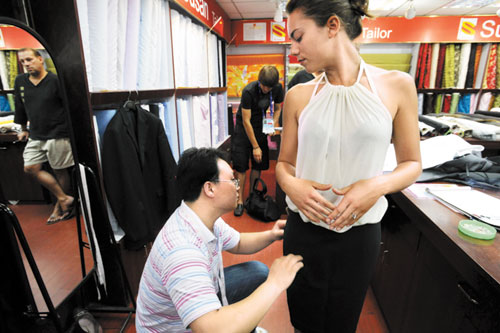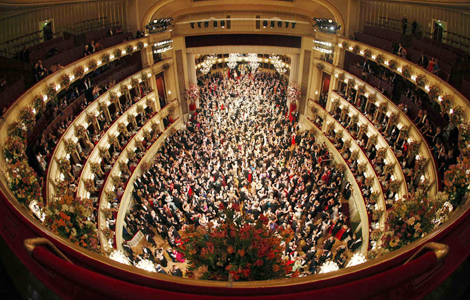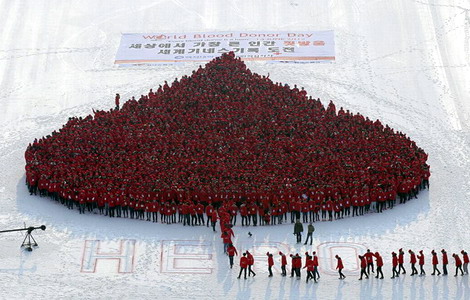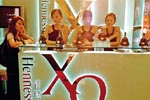Big boom in tailor-made clothes
Updated: 2012-02-27 09:29
By Li Woke (China Daily)
|
|||||||||||
|
A man providing a tailoring service to an overseas woman at Yaxiu Market in Beijing. Industry experts say Yaxiu is not the only place in China that is experiencing a boom in sales of tailor-made clothes. Many expatriates in the country find it difficult to shop in local stores because they are often of different sizes and have different tastes to locals. [Photo/China Daily]
|
Customers from around the world discover they are cheaper than off-the-peg department store garments and provide a better fit
BEIJING - On any given weekend, Beijing's Yaxiu Market is bustling with domestic and foreign shoppers, some of whom are looking for bargain-basement tailor-made clothes.
"Garment prices in Beijing department stores have gone crazy," said one customer. "One blouse at a big department store could cost around 1,000 yuan ($159) but a custom-made one here is around 300 yuan - much more affordable."
At Yaxiu Market, customers can choose the color, style, fabric and tailor. They are even encouraged to haggle for the best price. Some tailors will even make individual hats or scarves.
"My business has shown year-on-year growth. One of the reasons is we are cheaper but another is people can't find clothes that fit them in department stores. Many expatriates in Beijing find it difficult to shop in local stores because they are different sizes and have different tastes to locals," said Beijing tailor Gu Hongjian, a tape measure around his neck and a piece of chalk in hand.
"The sleeves of ready-to-wear shirts are too long and the neck is too tight for me so I have to get tailored shirts every year. And, of course, the price is better," said a Greek customer at the market.
Yaxiu is not the only place in China that is experiencing a boom in tailor-made clothes. Zhang Congbin, a tailor in the South China city of Guangzhou, promotes his tailor business through a micro blog at sina.com. It has attracted more than 55,000 fans and he receives dozens of orders every day. Zhang said he wanted to "offer good clothes that people can afford".
"It's not only the cheaper price and better quality. Wealthier people tend to dress differently and tailor-made clothes can make you look special," Gu said.
According to Henry Chiu, a tailor in Shanghai, as customers become richer, a ratio of 70 per cent foreigners and 30 per cent local customers have apparently become more brand-conscious.
"I arrived in China about eight years ago for the first time. Anybody with money here was wearing Versace, Armani, everywhere you looked. They just had the brands everywhere," said Raymond Mark Clacher, brand managing director of Gieves & Hawkes. "But now the real money is really clever, much more low-key".
Industry experts said tailoring will become more popular as the economic growth continues in China. More and more people will realize the benefits of better fabrics, great workmanship and a perfect fit.
Targeting the upper end of the market, a new business model that offers the skills of an experienced tailor, Italian and British labeled fabrics and quality service has emerged in China in recent years.
"Over the past year, Gieves & Hawkes has expanded very fast in the country," said Clacher. "In 2010, China surpassed the United Kingdom and became the biggest global market for Gieves & Hawkes in terms of sales volume. We saw a 20 percent year-on-year growth in 2011 and expect another 20 percent increase in 2012."
Gieves & Hawkes was founded in 1771 at 1 Savile Row, London. It is one of the oldest bespoke tailoring companies in the world and has a number of Royal Warrants from the UK monarchy. Gieves & Hawkes provides ready-to-wear clothes as well as bespoke and military tailoring.
The company entered the Chinese market in 1995 by opening its first store at the Beijing Peninsula Palace Hotel. So far, the company has set up more than 100 shops across China. It says it wants to be in almost every province.
Consultancy Bain & Co said the value of the high-end menswear market is growing at 14 percent a year compared with 8 percent annually for women's clothes.
Most of the growth is coming from China, with men comprising 75 percent of a luxury market that's growing by 20 to 25 percent a year. The boom in menswear is not limited to China. Herms said that sales from its dedicated men's shop in New York outpaced its 30 percent sales growth in the US.
"In this market in China, guys just want the best all the time. They have great suits, bags, belts and watches," said Clacher. "They are considered. They know what is the best."
Related Stories
Route tailor-made for Contador 2011-10-21 08:08
Chemistry Special: Henkel's tailor-made approach to China 2011-08-23 08:01
Beauty decked in other clothing 2011-10-07 11:37
Deceased get spring clothing 2011-04-06 08:01
- Geely to build cars in Egypt
- Home buyers jump in for fear of missing bottom
- Hopes that new strawberry varieties prove fruitful
- Protectionism and disputes 'will rise'
- Policy stability seen for estate market
- Big boom in tailor-made clothes
- China's growth good news for world: economist
- Energy chief stresses coal consumption control









